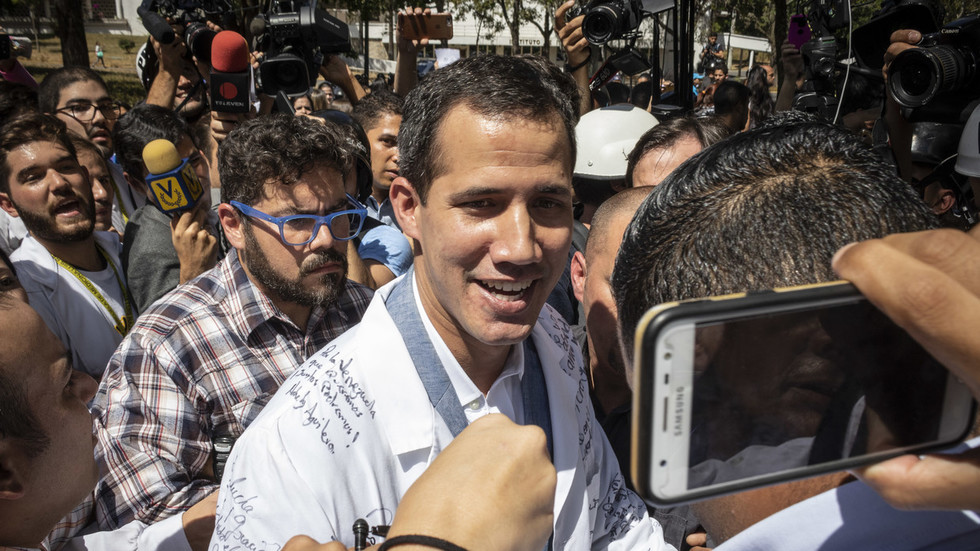‘Moral Disgrace’: EU Parliament Lectures World on Rule of Law, Then Destroys Legality in Venezuela
EUROPE, LATIN AMERICA AND THE CARIBBEAN, 4 Feb 2019
1 Feb 2019 – It’s a moral disgrace when the EU Parliament, which lectures the world on the need to respect the rule of law, uses legal language to tell lies about the legality of the situation in Venezuela, and to destroy that legality.
Exciting news from France: Marine le Pen is the country’s new president. After the Macron regime plunged the country into political crisis, Mrs Le Pen took the oath of office on Place de la Concorde on Friday before a small crowd of gilets jaunes (yellow vests) specially assembled – with the TV cameras – for the occasion.
Proclaiming that she was acting according to Article 7 of the Constitution of the 5th Republic, Mrs Le Pen announced that Emmanuel Macron is no longer in office. To be sure, the government and civil service, the police and the armed forces all continue to operate normally, and Mr Macron continues to work in the Elysée Palace as usual, while Mrs Le Pen is under investigation for financial irregularities. But as she has received official recognition from both Russia and China, she has now become the legitimate president of France.
Of course, this fictitious scenario is ridiculous. But it is no more ridiculous than the recognition of Juan Guaido as president of Venezuela, voted by the European Parliament on January 31, one week after the recognition of him by US President Donald Trump.
Read more: EU parliament urges member states to recognize Guaido as Venezuela’s interim president
Indeed, Brussels’ vote in favour of recognition is even more absurd than recognising Marine Le Pen because, unlike her, Juan Guaido has never been a candidate in his country’s presidential election, let alone been elected to it, and until a few weeks ago no one, not even in Venezuela, had even heard of him.
The resolution voted by the European Parliament is actually worse than President Trump’s “recognition” of Guaido on January 23. Four political groups in the European Parliament, acting independently of one another before later agreeing on a common resolution, sat down to formulate their texts, in legal language, which state that Juan Guaido is the legitimate president “according to Article 233 of the Venezuelan constitution.”
That they did this, and that the common resolution was then voted by all but 100 or so MEPs, is a frightening illustration of power of groupthink. Or perhaps it is just dishonesty. No one who has ever read Article 233 of the Venezuelan constitution could possibly conclude that it says anything of the kind.
On the contrary, Article 233 is precisely what Juan Guaido violated when he performed his little stunt of proclaiming himself president in a public square in Caracas on January 23.
Most countries’ constitutions have articles like Article 233 of the Constitution of the Bolivarian Republic of Venezuela. It deals with what happens if the president of the Republic does not, or cannot, fulfil his duties.
It lists six circumstances in which his term can be cut short: if he dies; if he resigns; if he is removed from office by a ruling of the country’s supreme court; if he is proclaimed physically or mentally unfit after a formal medical procedure validated by the National Assembly and by the supreme court; if he abandons his office; or if he is impeached by a popular referendum.
Read more: We must avoid mistake of Libya: Italian deputy FM speaks out against Venezuela regime change
Not a single one of these conditions has been fulfilled: President Maduro has not resigned; he is not dead or unfit; he has not been impeached by the courts or by the people. Worse, Article 233 goes on to say who takes power if the presidency falls vacant – which it has not – and, guess what? It specifies that it is the vice-president who takes over, in this case Mrs Delcy Rodriguez, not the president of the National Assembly (Guaido).
The only circumstance in which the president of the National Assembly takes over is if the president has not been inaugurated. As Maduro has been president since 2013, it is impossible to pretend that this is the case. He took the oath of office for his second term on January 10, in front of the president of the Supreme Tribunal of Justice.
Maduro’s opponents in the European Parliament, like the head of the Spanish conservative Partido popular delegation, Esteban Gonzalez Pons, claim that the inauguration of 10 January was invalid. In support of this claim, in an open letter sent to the president of the European Parliament on January 24, Mr Pons quotes Article 231 of the constitution:
“The candidate elected shall take office as President of the Republic on January 10 of the first year of his constitutional term, by taking an oath before the National Assembly.”
If one took Mr Pons at his word, one might perhaps believe that Maduro’s inauguration had indeed been invalid. But Mr Pons’ dishonesty is easily demonstrated: he does not quote the next sentence of this same Article 231 which says:
“If for any supervening reason, the person elected President of the Republic cannot be sworn in before the National Assembly, he shall take the oath of office before the Supreme Tribunal of Justice.”
So, the form of inauguration which Maduro’s enemies from Venezuela’s former colonial power in Europe claim is anti-constitutional is, in reality, specifically provided for in the constitution.
As Mr Pons also knows perfectly well, although he chooses to hide this too from his readers, there is a very good “supervening reason” why Maduro could not be sworn in before the National Assembly. It is that it was dissolved in 2017 for electoral fraud. The assembly had sworn in members whose elections had been declared invalid by the Supreme Court, which incidentally is the guardian of the constitution when it comes to electoral disputes.
In all other circumstances – in Poland, for instance, or in Hungary – members of the European Parliament typically demand that judges be given total independence and the right to overrule the decisions of elected assemblies if they deem laws anti-constitutional.
On Venezuela, by contrast, MEPs deploy precisely the opposite argument: the European Parliament pronounced in its resolution that the (dissolved) National Assembly was the only legitimate body in Venezuela, i.e. that the Supreme Court has no legitimacy.
It is obvious that there is a serious political crisis in Venezuela, between a presidency elected by universal suffrage and a political class in the parliament which opposes him. For foreign powers to wade into such a crisis is politically foolish and incidentally quite illegal under international law. But when a body like the European Parliament, which lectures the whole world on the need to respect the rule of law, uses legal language to tell outright lies about the legality of the situation in another country, and to destroy that legality, it is a moral disgrace.
__________________________________________________
 John Laughland, who has a doctorate in philosophy from the University of Oxford and who has taught at universities in Paris and Rome, is a historian and specialist in international affairs.
John Laughland, who has a doctorate in philosophy from the University of Oxford and who has taught at universities in Paris and Rome, is a historian and specialist in international affairs.
DISCLAIMER: The statements, views and opinions expressed in pieces republished here are solely those of the authors and do not necessarily represent those of TMS. In accordance with title 17 U.S.C. section 107, this material is distributed without profit to those who have expressed a prior interest in receiving the included information for research and educational purposes. TMS has no affiliation whatsoever with the originator of this article nor is TMS endorsed or sponsored by the originator. “GO TO ORIGINAL” links are provided as a convenience to our readers and allow for verification of authenticity. However, as originating pages are often updated by their originating host sites, the versions posted may not match the versions our readers view when clicking the “GO TO ORIGINAL” links. This site contains copyrighted material the use of which has not always been specifically authorized by the copyright owner. We are making such material available in our efforts to advance understanding of environmental, political, human rights, economic, democracy, scientific, and social justice issues, etc. We believe this constitutes a ‘fair use’ of any such copyrighted material as provided for in section 107 of the US Copyright Law. In accordance with Title 17 U.S.C. Section 107, the material on this site is distributed without profit to those who have expressed a prior interest in receiving the included information for research and educational purposes. For more information go to: http://www.law.cornell.edu/uscode/17/107.shtml. If you wish to use copyrighted material from this site for purposes of your own that go beyond ‘fair use’, you must obtain permission from the copyright owner.
Read more
Click here to go to the current weekly digest or pick another article:
EUROPE:
- Raised in a Colonial Death Cult: 600 Years of KU Leuven and still...
- The Rise of ‘Antidiplomacy’ in a Powerless Europe
- ‘Diplomatic Tsunami’ Nears as Europe Begins to Act against Israel’s ‘Complete Madness’ in Gaza
LATIN AMERICA AND THE CARIBBEAN:
